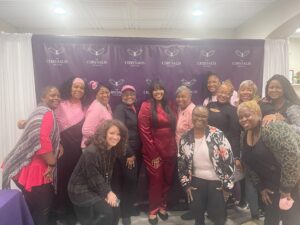39-year-old Jamil Rivers was busy raising three young boys and working as a financial executive when she experienced a cough that wouldn’t go away, accompanied by a pinch on her side. Her gut told her something was off, and when antibiotics didn’t resolve the issue, she pushed her doctor to perform imaging. An ultrasound and subsequent testing revealed stage 4, hormone-positive breast cancer that had spread throughout much of her body.
Her youngest son was in kindergarten at the time, and her husband was disabled due to a previous cancer diagnosis. Amid all her responsibilities, Jamil catapulted herself into advocacy, seeking to learn as much as she could and get the best possible care. “I was trying to do everything I could to be here for my family,” she recalls. “I had no idea breast cancer was so complicated. I didn’t know about different types of breast cancer or treatment types.”
 Taking charge of her own health
Taking charge of her own health
Jamil’s family relied on the health benefits she received through work, so she kept her diagnosis to herself and kept working. At the same time, she immersed herself in health research and policy. During infusions, other patients would pop into her treatment room, asking if she could share what she had learned. In the midst of her own health battle, she was determined to help other women thrive throughout treatment. “It grew from talking to five women to 50 women to 500,” she recalls. “And now we’re supporting 20,000 women across the country.”
Recalling her own experience having to fight to get necessary medical tests, Jamil established the nonprofit 501C3 organization the Chrysalis Initiative to counteract breast health inequities. Patient education and activation is at the heart of the organization’s mission. Her knowledge and experiences were the driving force to help advance legislative policy, medical research, and support for individuals with breast cancer.
Jamil and her team at the Chrysalis Initiative offer a host of learning services, including one-on-one coaching and social supports to help patients take charge of their healthcare journey. They have seen numerous benefits of health literacy, including improved outcomes, reduced likelihood of complications, and improved adherence to regimens. As one example, the guidelines for breast cancer screenings can be confusing, and the Chrysalis Initiative is helping to address that issue. “If you are a Black woman, you should not be waiting until you’re 40 to get a mammogram,” she says. “Screening should begin 10 years prior to any known cancer diagnosis in your family, regardless of the type of cancer.”
The more conversations Jamil had with other patients, the more she began to understand the inequities other Black women faced in healthcare. Notably, Black women were often turned away when first telling their provider about symptoms, and were often delayed in receiving testing. “When there’s a positive hit for cancer, you don’t want it to have the opportunity to spread and become drug resistant, so it’s really important to get assessed quickly and appropriately with a full diagnostic workup so you know specifically what type of cancer is and what treatment is best,” she says.
“Black women are 71% more likely to die of breast cancer than their White counterparts, so you have to question what is going on here,” she says. “Although there was knowledge in the medical community about inequities, it seemed like the default response was that this was all associated with poverty or lack of insurance, but what I found is that it’s more nuanced than that. There was bias that was contributing to these disparities. Even if a Black woman had adequate insurance and income, she was often not being presented with the standard of care.”
Improving representation in clinical trials
Jamil worked tirelessly to better understand and address gaps in healthcare often faced by Black women. One major issue is the lack of representation in clinical trials. This is a tremendous health equity concern, as it’s difficult to ascertain whether new treatments are safe and effective for all patients if the trial doesn’t have a diverse population. This is a multi-faceted problem, complicated by racial biases as well as historic mistrust of the medical community. As one example, a recent study presented at ASCO found nearly half of Black patients with metastatic breast cancer were not offered clinical trial opportunities.
Other impediments to equitable trial access include misconceptions about clinical trials. Often people assume trials are a place of last resort when in reality, they can offer access to emerging treatments not yet available through standard of care. Many people also worry that researchers will use them as a “guinea pig”.
This is where education is one essential component. It helps open up trial opportunities for all patients, supports them in analyzing the pros and cons, and helps each person discover the right trial opportunities for their situation. To assist with this, Jamil participates in numerous community health events, which facilitated the design and funding of two clinical trials for patients with metastatic breast cancer.
Empowering patients through health literacy
 The Chrysalis Initiative created a layman’s terms breast cancer guide to help fellow patients know what questions to ask, and connects each patient with a personal coach who can support them with whatever issues arise along the way.“If you have this knowledge, now you’re in a position to advocate for yourself,” she says.
The Chrysalis Initiative created a layman’s terms breast cancer guide to help fellow patients know what questions to ask, and connects each patient with a personal coach who can support them with whatever issues arise along the way.“If you have this knowledge, now you’re in a position to advocate for yourself,” she says.
Jamil encourages people with any type of cancer to reach out to the organization to understand what their legal rights are when it comes to healthcare and health insurance and to learn about all aspects of care, from the screenings and genetic testing needed to navigating the health care system. “Navigating the healthcare system can be intimidating, but you don’t have to go it alone,” Jamil says. Her team empowers people with knowledge of standard of care, and what test and what treatment they should have access to – whether you have insurance or not – how to get a second opinion, and more.
Educating healthcare providers
The Chrysalis Initiative also works with cancer centers to deliver evidence-based equity assessments and support, as well as Cancer Curriculum Training for oncology nurse navigators and medical professionals. These multi-factorial assessments are based on the organization’s own historical data as well as in-depth analysis through working with the organization’s own patients in real time. This is an effective way to both understand and address gaps in the continuum of care and to build on what is working well.
“When it comes to equity assessments, it’s not enough to just check a box. We work in partnership with organizations to help them figure out what is contributing to barriers to care,” explains Jamil. “Together, we look at the care, the delivery, the continuum, the resources, the support, and how this actually reaches each patient coming through those doors.”
In late 2022, the Chrysalis Initiative joined PlatformQ Health in the delivery of a free continuing medication education program “Navigating the Use of PARP Inhibitors to Treat Ovarian Cancer.” One notable component of the program was inclusion of patient voice. That is, video clips of patients sharing their experiences after an ovarian cancer diagnosis. These patient vignettes are a powerful addition to educational programs, helping healthcare providers to more fully understand their patients’ experiences and ways they can both improve care and communication with their patients.
“Patient voice is so powerful,” says Jamil. “And it’s been a great experience for the patients who have shared their stories as well. They understand that if change is going to happen, that people need to get the real facts. The best educators are patients who are living with cancer themselves.”
Learn more about diversity, equity, and inclusion initiatives in healthcare education.


